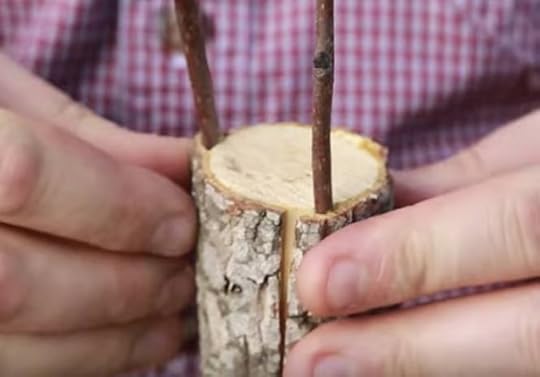date newest »
newest »
 newest »
newest »
 Hi Sara.
Hi Sara.Thanks for the interesting article. We have four hundred olive trees on the west coast of the Peloponnese, only a few of which have been grafted. They never seem to produce as well as the non-grafted trees, but that’s partly because we don’t always have enough water to irrigate them.
As it happens, my wife and I are a week into this year’s olive harvest. This is our thirteenth season and, to be perfectly honest, I dread it more and more every year. Some of your readers will possibly have a rather romantic image of olive harvesting, but the reality is that it’s extremely hard work, mind-numbingly tedious and an activity that ought to be registered with the Dangerous Sports Association!
Sorry if I’ve destroyed any illusions, but if anyone wants to find out more about the realities of olive harvesting, here’s a link to my series of short podcasts about life as an expat in Greece: The olive harvesting episode is Episode 10 and it’s called "I’d Rather Eat My Own Face”.
P.S. I’m not always this grumpy. Blame olive harvest fatigue. :-)
P.P.S. Sorry I went on so long.
 A delightful way to discover one of the oldest horticultural techniques for propagating clones for their unique - and usually highly desirable - characteristics.
A delightful way to discover one of the oldest horticultural techniques for propagating clones for their unique - and usually highly desirable - characteristics.
 Albert wrote: "A delightful way to discover one of the oldest horticultural techniques for propagating clones for their unique - and usually highly desirable - characteristics."
Albert wrote: "A delightful way to discover one of the oldest horticultural techniques for propagating clones for their unique - and usually highly desirable - characteristics."That's quite strange. Hearing something with such a heavy factual slant told by Sara, the author of something mainly fictional blurs the boundary. Maybe one of Sara's stories should veer off into a parallel universe (not Yorkshire) and with another style and then jump back to the village? Or maybe not!
 Nick wrote: "Albert wrote: "A delightful way to discover one of the oldest horticultural techniques for propagating clones for their unique - and usually highly desirable - characteristics."
Nick wrote: "Albert wrote: "A delightful way to discover one of the oldest horticultural techniques for propagating clones for their unique - and usually highly desirable - characteristics."That's quite stran..."
There is quite an art to making science interesting as well as pertinent to vital aspects of everyday life. One of the things that makes Sara's stories ring true.
 Sara wrote: "Albert wrote: "A delightful way to discover one of the oldest horticultural techniques for propagating clones for their unique - and usually highly desirable - characteristics."
Sara wrote: "Albert wrote: "A delightful way to discover one of the oldest horticultural techniques for propagating clones for their unique - and usually highly desirable - characteristics."Hi Albert, I'm ver..."
You probably know me better as Al.
 Sara wrote: "Rob wrote: "Hi Sara.
Sara wrote: "Rob wrote: "Hi Sara.Thanks for the interesting article. We have four hundred olive trees on the west coast of the Peloponnese, only a few of which have been grafted. They never seem to produce as..."
Hi again, Sara.
Another reason the grafted trees don't produce as well is probably because they were planted too close together - not by us!
Glad to hear you're enjoying the podcasts.
Incidentally, what is your daily word count? Mine is tragically variable!
 Rob wrote: "Sara wrote: "Rob wrote: "Hi Sara.
Rob wrote: "Sara wrote: "Rob wrote: "Hi Sara.Thanks for the interesting article. We have four hundred olive trees on the west coast of the Peloponnese, only a few of which have been grafted. They never seem ..."
Rob, it's entirely possible (and likely) that things like water and spacing affect olive productivity. It's also possible that it results from genetics. It would be interesting to know more about the clone selected as scion and why. Perhaps the propagator knew it was a low producer but selected it because of outstanding eating quality or due to some characteristics of the oil or whatever she or he chose to cultivate. Blame low productivity on genetics, environment, cultural practices, ... Whatever. But the method of propagation is fairly low among likely causes. Cheers.
 Albert wrote: "Rob wrote: "Sara wrote: "Rob wrote: "Hi Sara.
Albert wrote: "Rob wrote: "Sara wrote: "Rob wrote: "Hi Sara.Thanks for the interesting article. We have four hundred olive trees on the west coast of the Peloponnese, only a few of which have been grafted. They..."
Thanks, Albert. That's interesting, although I've no idea about the origins of our grafted trees as they were established by the previous owner of the land long before we arrived. As for the quality of the oil they produce, I can't say it's any better than the oil from our non-grafted trees.







to discover even on a country walk. Thank you again Sara.
X